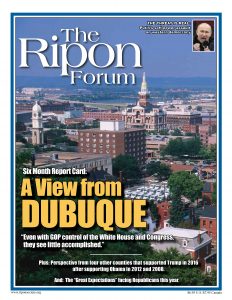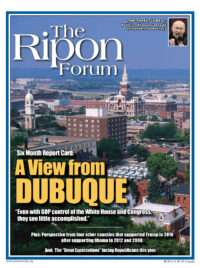 Earlier this year, I was having a conversation with two veteran GOP lobbyists, and, like so many other conversations in Washington these days, the topic turned to the political environment and the air of uncertainty that has descended upon this town.
Earlier this year, I was having a conversation with two veteran GOP lobbyists, and, like so many other conversations in Washington these days, the topic turned to the political environment and the air of uncertainty that has descended upon this town.
“I would think that the challenge for you all when you return to your headquarters or home office,” I said to them, “is that the political tea leaves you have spent your entire careers reading are no longer applicable. The question is whether the tea leaves will return in one fashion or another, or if we are going to spend the next four years not knowing day to day what will happen next.”
The conversation took place before the 100-day mark of the Trump Administration. Now that we have reached the six-month mark, it is worth recalling because the uncertain atmosphere in Washington has only gotten worse. Legislation is stalled, positions are unfilled, and the great hope among Republicans that the party is finally in a position to enact its agenda are being tempered by an erratic President and a special counsel investigation that is not going away.
And yet despite this uncertainty, a sense of optimism remains. Republicans are optimistic because the party just won its fourth special election, overcoming not only the arguments of those in the media who said the GOP agenda was unpopular, but the millions of dollars spent by liberal special interest groups who claimed that was in fact the case. As for Americans, they’re hopeful, too. A recent CNBC survey found that 30% of people are optimistic about the economy both in the short and long term. This is the first time the percentage has been that high in two consecutive quarters during the survey’s 10-year history. Americans are also hopeful because – for one brief moment after the despicable shooting on June 14th – their elected leaders in Washington came together in a show of unity and a demonstration of national resolve. Moving forward, we all hope this sense of unity can last.
To better assess what Americans think about the Trump Administration and Republican control of Congress as we reach the halfway point of 2017, The Ripon Forum reached out to leading political observers in counties that supported Donald Trump for President in 2016 after supporting Barack Obama in 2012 and 2008. There were over 200 of these “Obama-Trump” counties in total, and they helped define last year’s campaign. They will also help define the Trump Presidency in the months and years ahead – for both good and for bad. Indeed, as Muhlenberg College Professor Christopher Borick writes in his assessment from one of these counties, “If the Trump electoral coalition does begin to come apart, the canary in the coal mine is likely to be Northampton County, Pennsylvania.”
In addition to these six month report cards from political experts in these five key counties, the latest edition of the Forum also includes an analysis by veteran GOP strategists David Winston and Myra Miller looking at the “Great Expectations” that remain for Republicans as they begin the last half of this year and look toward the mid-terms in 2018. “Voters gave Republicans an across-the-board win,” the pair writes of last year’s election results. “But to whom much is given, much is required. Now, voters expect the President and the GOP Congress to deliver the change they promised. Without it, those same voters may well rock the boat again in 2018 or, at a minimum, stay home.”
To the extent that so much of the unease being felt in Washington these days stems from the fact that Russians interfered in our election last year, the latest edition of the Forum features an essay by Jan Erik Surotchak of the International Republican Institute. Surotchak and his colleagues at the IRI have been investigating this issue for some time. In fact, they have a special name for the investigation — the Beacon Project. As Surotchak writes in his piece, their findings should leave no doubt that, “The Russian Federation is carrying out a sophisticated and opportunistic soft-power campaign to weaken democratic institutions in Europe.” The findings should also leave no doubt that the Russian soft-power campaign last year targeted the U.S.
Another threat of a very different nature is the opioid epidemic sweeping across America. In an op-ed, West Virginia Congressman Evan Jenkins writes about the impact of opioid addiction on his hard-hit home state, and what Congress is doing to bring this crisis to an end.
With Virginian’s going to the polls this November to choose a new Governor, political expert Brian Schoeneman examines the results of the June 13th primary, and shares his thoughts on how the general election in the Commonwealth could be a bellwether to the 2018 campaign.
In our latest debate, defense experts Daniel Gouré and Doug Bandow square off in a discussion about the size of the U.S. military and whether it needs to be larger. And in our latest Ripon Profile, Louisiana Senator Bill Cassidy discusses, among other topics, the priorities he would like achieve this year.
As always, we hope you find this latest edition of the Forum interesting, and welcome any comments or ideas you may have.
Lou Zickar
Editor of The Ripon Forum
louzickar@clu.ccw.mybluehost.me




